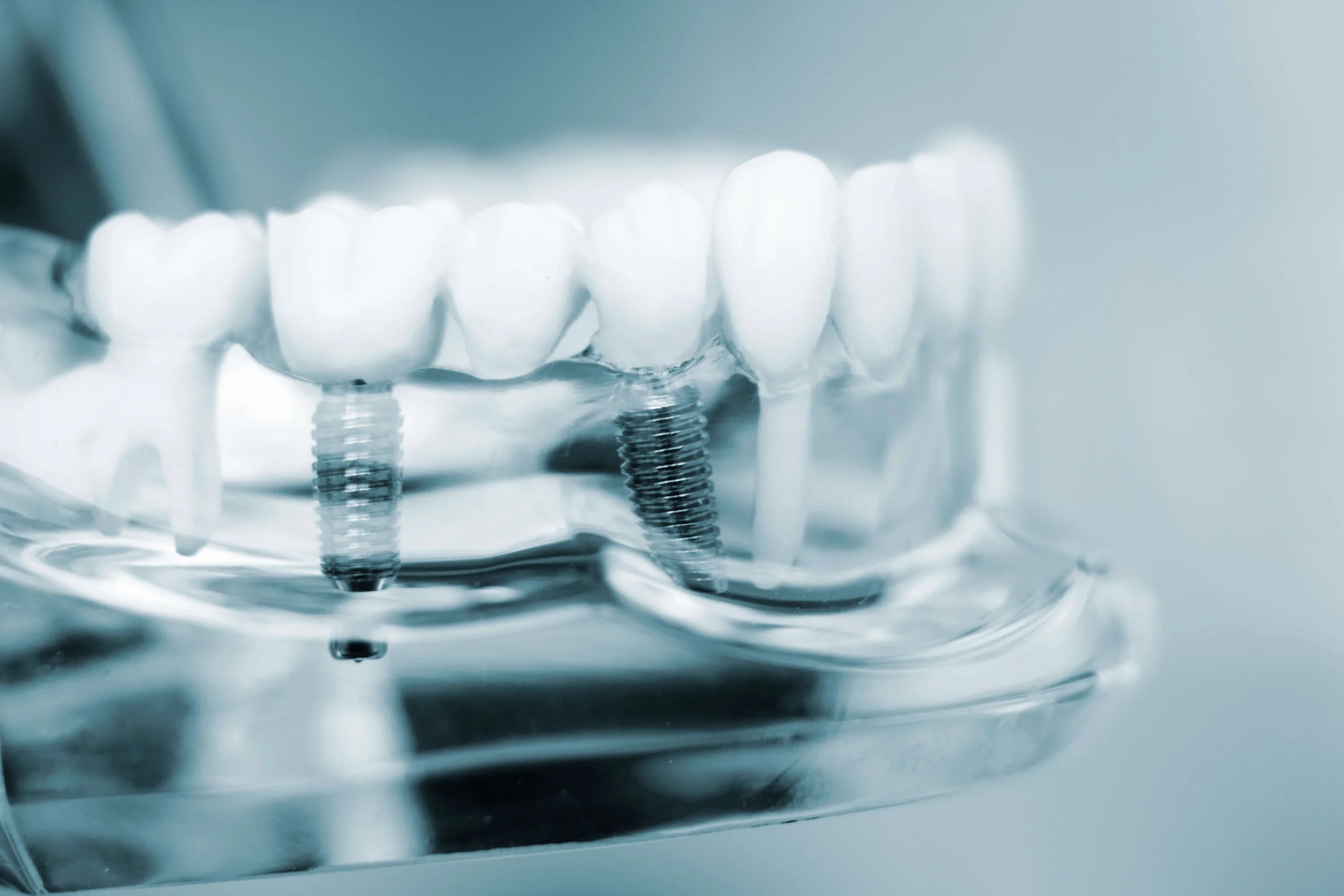
Full mouth reconstruction is a comprehensive restorative process that involves rehabilitating and restoring all of the teeth in the mouth. The goals of full mouth reconstruction are to restore proper dental function, improve aesthetics, increase comfort, and enhance overall oral health. This extensive procedure may involve multiple different treatments like dental implants, crowns, bridges, veneers, and dentures to completely transform your smile.
Candidates for full mouth reconstruction typically include those with significant tooth decay or damage, gum disease, or bite issues that require realignment. If you are suffering from pain, difficulty eating, speech problems, TMJ issues, or severely compromised aesthetics due to extensive tooth problems, you may benefit greatly from complete mouth restoration.
The Benefits of Full Mouth Reconstruction
Those with extensive tooth damage often experience oral health issues plus difficulty chewing, TMJ pain, poor aesthetics, and reduced confidence. Full mouth reconstruction aims to comprehensively rehabilitate teeth and gums to restore form and function.
Full mouth reconstruction offers many benefits for qualifying patients, including:
- Restored Form and Function: Damaged, decayed, or missing teeth are replaced to properly restore shape and improve chewing ability.
- Improved Speech: Correctly aligned teeth make proper enunciation easier.
- Enhanced Smile Aesthetics: Smile flaws are corrected to boost beauty and self-image.
- Increased Confidence: A beautiful new smile improves confidence in work, relationships, and more.
- Corrected Bite Alignment: Identifying and treating bite issues, like overbites or underbites, relieves pain and discomfort.
- Reduced TMJ and Headaches: Optimizing alignment alleviates strain on the jaw joints.
- Improved Dental Health: Replacing problem teeth improves overall oral health and hygiene.
- Reduced Risk of Issues: Restored mouths experience less problems like tooth loss, decay, and disease.
Full mouth reconstruction offers restorative solutions to not just oral health problems but also issues with proper speech, bite alignment, headaches, aesthetics, and self-confidence. Patients can experience dramatically improved comfort, function, dental hygiene, and quality of life after this comprehensive treatment.
Using Dental Implants in Full Mouth Restoration
Dental implants offer an incredibly effective and beneficial solution for full mouth restorations. During this comprehensive reconstructive process, implants act as artificial roots to provide durable support for replacement teeth. The small titanium posts are surgically inserted into the jawbone, where they fuse securely with living bone tissue through a process called osseointegration. Once healed, implants can hold crowns, bridges, dentures, and other prosthetics in place for many years.
Implants provide stability unmatched by other restorative treatments. By integrating into the jaw, they offer a sturdy foundation able to withstand the forces of biting and chewing. Implants prevent the bone loss that normally occurs over time after extractions. They also permit ideal positioning and spacing of prosthetic teeth for optimized function and natural aesthetics. Multiple implants can support full bridges and arches when strategically placed, eliminating the need to file down adjacent teeth for crowns or rely on neighboring teeth for support.
The seamless integration into bone allows implants to function just like natural tooth roots. This leads to very high long-term success and overall success. Over 95% of dental implants integrate successfully when properly placed and cared for. The titanium fuses so securely that patients often forget they have an implant. And the lifelike crowns attached on top enable beautiful, realistic smiles.
Dental implants offer the ability to securely support prosthetic teeth over the long-term, provide stability, preserve bone structure, allow optimal tooth placement, eliminate reliance on neighboring teeth, and withstand biting forces – all while functioning and looking just like natural teeth.
The Implant Placement Process
Placing dental implants for full mouth restoration involves multiple steps over several months:
- Initial Consultation: The dentist will assess your unique needs and anatomy to plan treatment.
- CT Scan: A 3D CT scan allows detailed visualization of bone structure prior to surgery.
- Anesthesia: Local anesthesia will be administered to numb the area during surgery.
- Incision and Drilling: A small incision is made in the gums to expose bone, and a cavity is precisely drilled based on planned positioning.
- Implant Insertion: The titanium implant is screwed into the newly created socket in the jawbone.
- Suturing and Healing: The gums will be sutured over the implant site where osseointegration with the bone will occur over 2-6 months.
- Abutment Attachment: A titanium abutment is secured to the integrated implant, protruding through the gums to hold the visible prosthetic tooth.
- Prosthesis Placement: After healing, custom-designed replacement teeth are securely attached to the implants.
- Follow-Up Exams: Multiple follow-up appointments will monitor the implant sites.
Caring for Dental Implants
While incredibly strong and durable, dental implants still require proper care and maintenance for optimal long-term function:
- Practice Excellent Oral Hygiene: Meticulous brushing, flossing, and regular dental visits are key.
- Use Recommended Toothpastes and Mouthwashes: Products aimed at implant care help reduce bacteria.
- Have Professional Cleanings: See the hygienist every 3-6 months to remove mineralized plaque.
- Avoid Smoking and Damage: Habits like smoking and chewing ice negatively impact implants.
- Eat a Balanced Diet: Proper nutrients from a healthy diet support healing and longevity.
- Replace Toothbrushes: Swap out brushes every 3 months to prevent bacteria transmission.
- Get Regular Dental Checkups: Professional monitoring allows early intervention if needed.
- Treat Peri-Implantitis: This infection of gum and bone requires prompt antibiotic treatment.
- Wear a Nightguard if Needed: Those with grinding or clenching should use a guard to avoid implant damage.
- Avoid Trauma: Be cautious to prevent any blows or injury to the area that could impact the implant.
To Conclude
Full mouth reconstruction comprehensively rehabilitates and restores all teeth in the mouth using treatments like dental implants, bridges, crowns, veneers, and dentures. Dental implants act as artificial tooth roots, fusing securely into the jawbone for incredible stability and allowing optimal placement of prosthetic teeth. The implant process involves planning, precise surgical placement, healing time for osseointegration, and finally restoration with realistic-looking prosthetic teeth. While strong and durable, implants do require diligent at-home care and professional maintenance. With proper implant placement and ongoing care, full mouth reconstructions can fully restore function and aesthetics for a healthy, beautiful smile.
Get a Strong, Stable Smile with Dental Implants
Full mouth reconstruction lays the foundation for a revitalized, healthy smile. This blog explains how strategic dental implant placement acts as sturdy new roots to support beautiful prosthetic teeth.
If you’re located near Whitby and considering full mouth restoration, the skilled dentists at Brooklin Dental Centre can help. We offer precise dental implant placement utilizing the latest techniques. As your local provider of Whitby dental implants, we would love to discuss transforming your smile from the ground up.
Contact us today to schedule a dental implants consultation!



